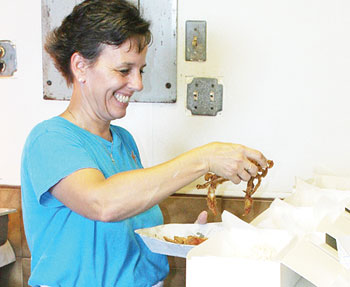Seafood safe despite oil spill

Karen Squires serves up some fresh calamari at Star Fish Co.
in Cortez on Monday afternoon. Seafood is carefully inspected
and safe, despite the oil spill, officials say.
SUN PHOTO/CINDY LANE
That grouper sandwich being offered at restaurants in Florida, including those on Anna Maria Island, is safe to eat, oil spill or not, thanks to a team effort by fishermen, processors, inspectors and regulators, according to the National Oceanic and Atmospheric Administration (NOAA).
Since the Deepwater Horizon oil spill began more than three months ago, federal fisheries regulators have tracked the oil’s path, closing and reopening portions of the Gulf of Mexico to fishing depending on where currents and winds take the oil, according to NOAA’s National Marine Fisheries Service, which is working with the U.S. Food and Drug Administration and other federal and state agencies to monitor seafood safety.
“No single agency could adequately ensure the safety of seafood coming from the Gulf following this tragedy, but in working together, we can be sure that tainted waters are closed as appropriate, contaminated seafood is not allowed to make it to market and that closed waters can be reopened to fishing as soon as it is safe,” said Eric Schwaab, assistant administrator at NOAA’s Fisheries Service.
While fish could swim from a contaminated zone into a clean zone where fishing is allowed, it’s unlikely, according to NOAA, because the closed areas have built-in buffer zones to account for fish movement.
During the three months since the oil spill, about a third of the Gulf has been closed, all in federal waters. The closed areas are patrolled both on the water and by vessel monitoring systems required on commercial fishing boats.
“If they approach zones that are contaminated, sensors notify regulators to call them back,” said Karen Bell of A.P. Bell Fish Co. in Cortez.
At the docks, the catch is inspected by both fish houses and government inspectors, she said.
“We’ve put added inspections into place, with some aquaculture inspectors going through sensor testing,” said Terence McElroy of the Florida Department of Agriculture and Consumer Services Bureau of Seafood and Aquaculture Marketing.
A new training class for inspectors is fine tuning their skills, especially the sense of smell, which is very sensitive to hydrocarbons, said John Stevely, the University of Florida’s Sea Grant extension agent in Palmetto.
Polycyclic aromatic hydrocarbons, or PAHs, are the most common carcinogenic components of crude oil.
“The nose knows,” Stevely said. “To run analyticals on hydrocarbons takes time and costs money, but providing this training to inspectors is a practical way to beef up screening procedures.”
Impact on sales
Commercial seafood buyers in non-Gulf areas have purchased seafood elsewhere, incorrectly assuming the entire Gulf is affected by the oil spill, McElroy said. He added that the state agriculture department is working with Florida Publix stores and other retailers elsewhere to overcome the misperceptions and promote seafood sales.
A.P. Bell Fish Co. had to freeze 25,000 pounds of grouper after news of the oil spill hit. The company’s wholesale customers know that Cortez seafood is safe, but some purchased less because their retail customers were misinformed, Bell said. She said sales dropped off for a while, but are recovering, with Star Fish Co. sales up in June.
Seafood sales at Cortez Bait and Seafood in Cortez have not been affected by the spill, Kim McVey said.
Restaurants, including the Gulf Drive Café in Bradenton Beach, the Waterfront in Anna Maria and Rotten Ralph’s, with eateries in both cities, also say they have not seen a drop in sales due to the oil spill.
“It hasn’t affected us at all,” said Greg Grosser, manager of the Waterfront, who has been able to buy oysters from the east coast since his usual supply of Texas oysters dried up after the oil spill.
At Rotten Ralph’s, “We haven’t seen any difference,” kitchen manager Lynn Lamar said, although she had to raise the price on shrimp due to the spill.
“I buy Gulf shrimp from Louisiana,” she said. “It got harder to get, then the price jumped up,” nearly double.
But customers still order shrimp, she said, perhaps because of a note on the menu that states: “We will support our shrimpers until there is no more shrimp available.”
It’s too early to tell whether a temporary cap that sealed the well earlier this month is having an effect on sales, according to Stevely, but seafood lovers should be reassured that it’s safe, he said.
To report any concerns about seafood safety, call 1-888-INFO-FDA. For updated information about the status of Florida’s open and closed fishing harvest areas and the availability of seafood varieties, call 1-800-357-4273.

